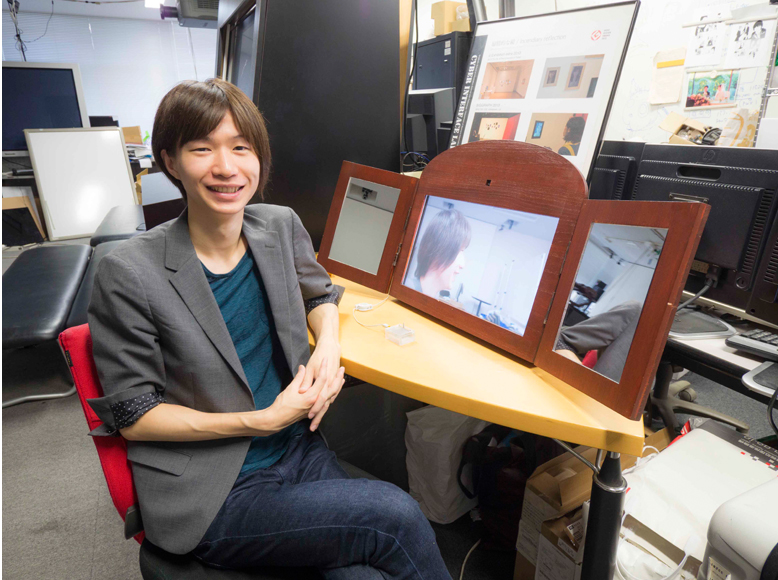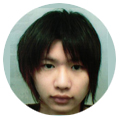“Mirror Image”: Do we cry because we're sad, or are we sad because we cry?
Shigeo Yoshida
First-year Doctoral degree student, Graduate School of Interdisciplinary Information Studies

Shigeo (face unaltered by image processing) and the Incendiary Reflection. The degree of change in facial expression can be adjusted with a controller.
When you sit in front of this video monitor, your face is reflected onto the screen. At first, this occurrence may seem like nothing out of the ordinary for the “selfie generation” of today. Look closely, however, and you'll notice that something unusual is afoot. Even though you're putting on a serious face, the one reflected in the monitor is smiling or showing a sad expression. This monitor is actually a device created by Shigeo called the Incendiary Reflection. After its camera captures your face, the device instantly edits particular aspects of your expression and displays the processed image on its screen. If the image editing software raised your cheeks and the corners of your mouth, you'll look like you're smiling. On the other hand, if the ends of your eyebrows are lowered, you will appear to be sad.
“I wanted to prove a theory in cognitive psychology which stipulates that people don't cry because they're sad; rather, they're sad because they cry. When the face in the screen is smiling back at you, it cheers you up for some reason. ”
The range of potential uses for this technology is wide and varied. For instance, customers seeing their smiling faces in the mirror as they try on clothes may lead to an increase in sales for apparel stores. By the same token, perhaps this kind of device can prove useful in treatments for people suffering from depression, who tend to have rather emotionless facial expressions.
“A number of companies have expressed interest in my creation, and experiments with it have already been producing results. It would be great if this technology could be put to practical use in society. Right now though, the problem is that I've been told my face is still rather expressionless…”
Shigeo studied engineering for five years at a technical high school and college, and transferred toentered the University as a third-year undergraduate student in the Faculty of Engineering's Department of Mechanical Engineering. He went on to study at the Graduate School of Interdisciplinary Information Studies, a Graduate School specializing in the integration of science with the arts. He cites his desire to examine how engineering technologies are applied to the real world as the reason for this shift in research direction. Shigeo was also influenced by one of the leading minds in computer user interface research.
“When I was an undergrad, I stumbled upon (Graduate School of Information Science and Technology) Professor Takeo Igarashi's project after I put in the search query ‘robot + part-time job' online. I am sure that my experience helping with that project led me to where I am today.”
Another one of Shigeo's inventions is very typical of his character. The setting: a wedding. The bride and groom place special rings on their fingers and kiss. The kiss acts as a switch to turn on a digital photo frame, which displays congratulatory visuals for the happy couple. The device behind this chic contraption is known as “Ring Brings Kiss.” The day when this somewhat awkwardly-smiling “experience designer” creates the commonplace products of the future doesn't seem so far away.
Q&A Extras
What were the most important things to keep in mind when making the “Incendiary Reflection”?
“Making sure the device changes your facial expression as slightly as possible, as well as having a fast response time.”
Besides the “Incendiary Reflection,” what's another project that best represents your research?
“My ‘Tear Drop Glasses,' which release water around your eyes.”
How have you changed since your technical high school days?
“I don't have gym class anymore, so I lost 5kg.”
What's a good thing about UTokyo?
“That I have friends who will debate things with me.”
What does being “tough” mean to you?
“In terms of academics, I think it means having the ability to explain your thoughts. On a mental level, it means having the willpower to accomplish things that no other person has.”

Shigeo before UTokyo
This photo was used for his student ID card when he was a technical high school and college student.




